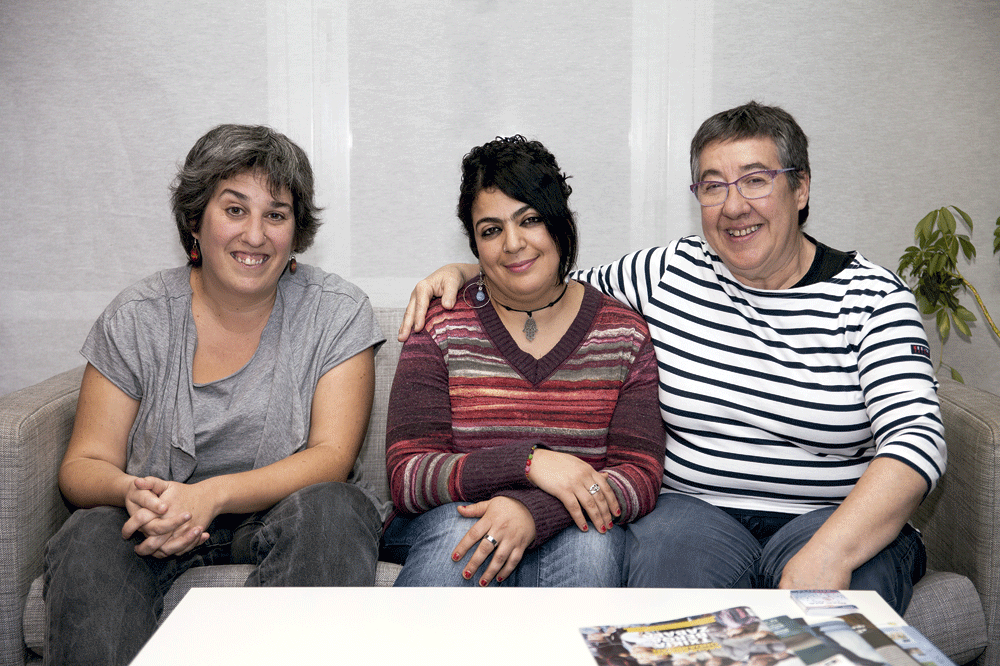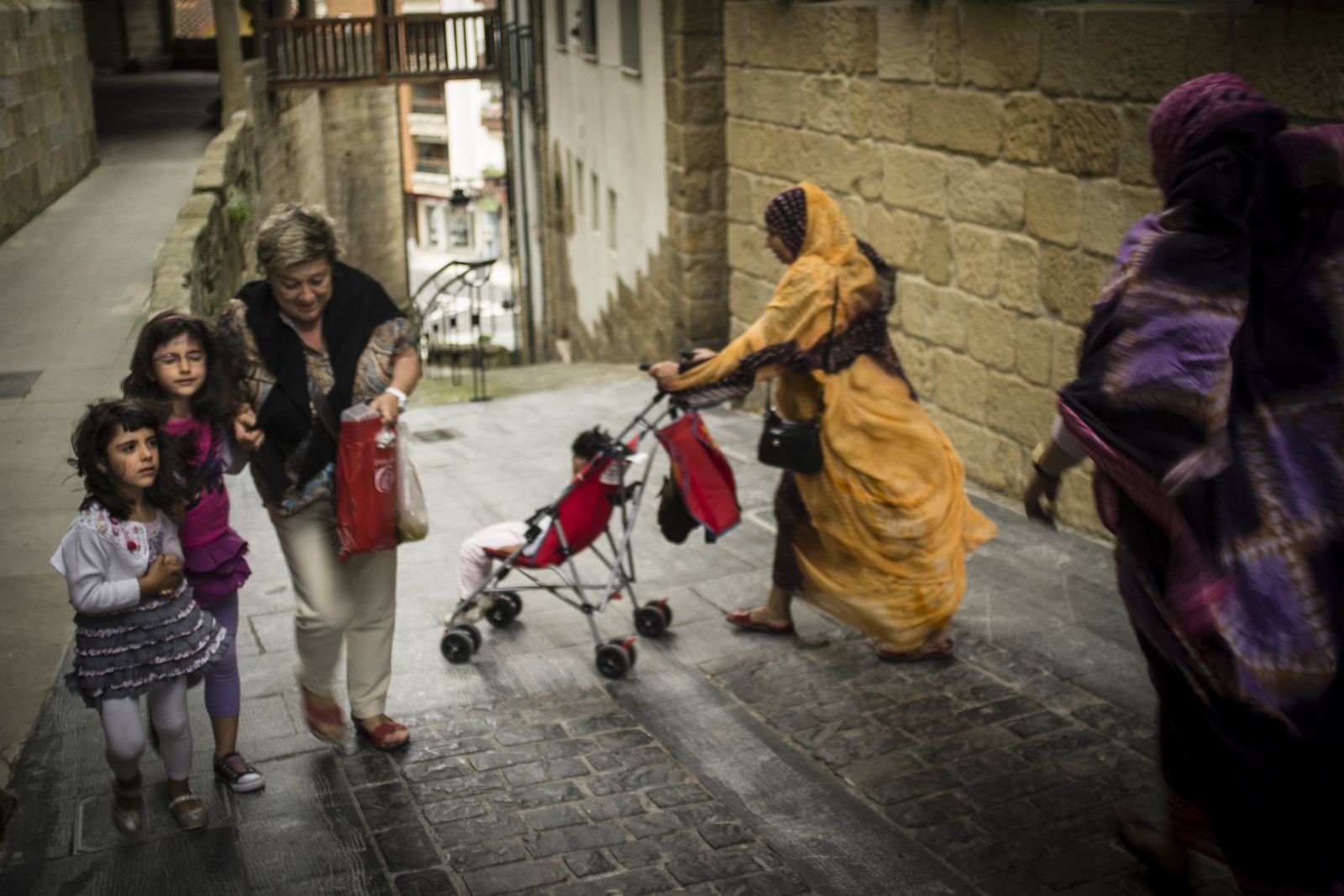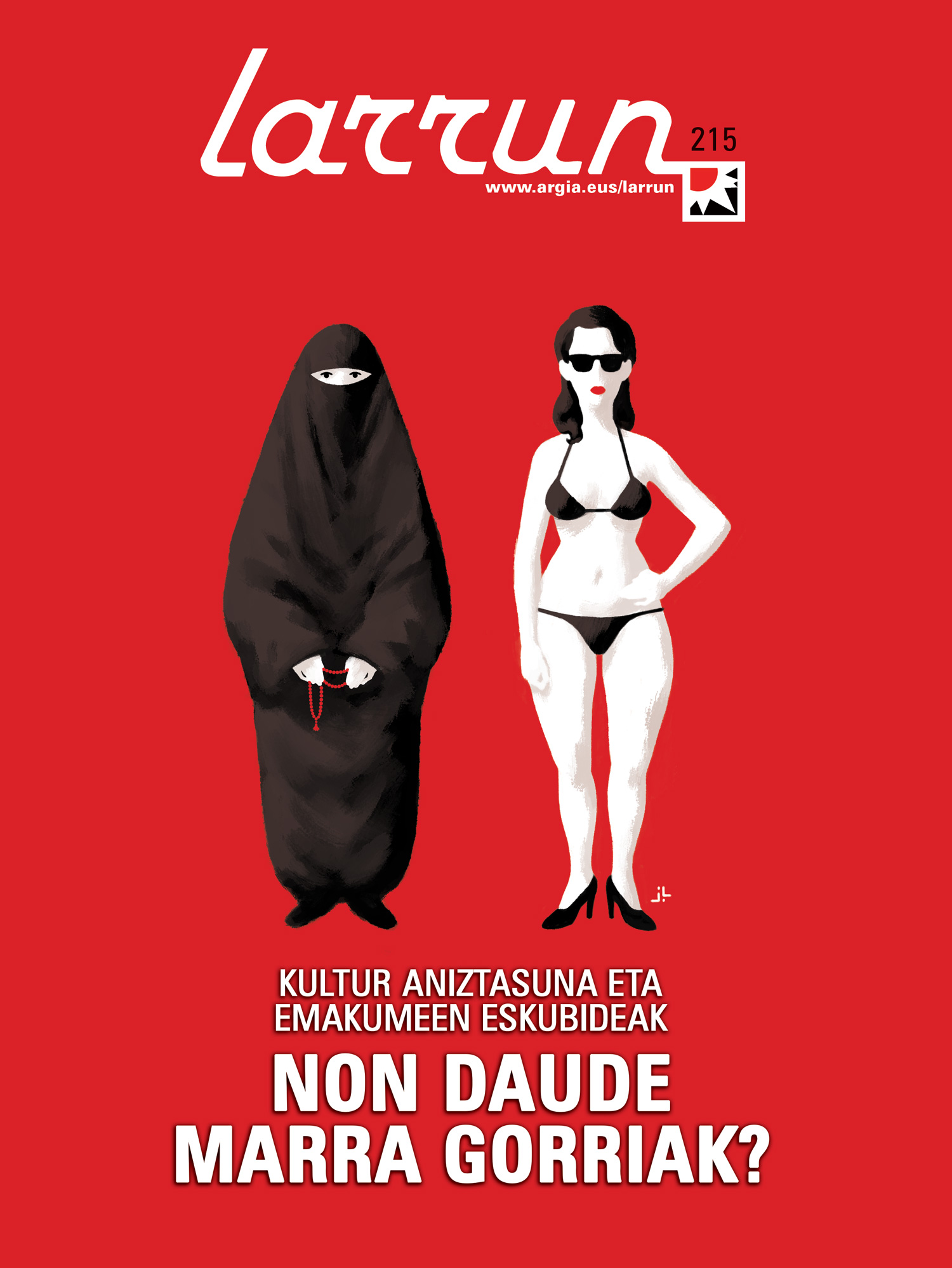Women with veil: Who has the legitimacy to judge them?
- It was a pity. There's only three people at the table. A fourth one, Muna, we thought he was going to be among us. It has not been able to come at the last moment. We wanted to talk about the debate generated by the veil that some Muslim women wear, and at last, the only one using the scarf has failed us. Eguskiza, Uria and El Haloui do not use mantelina, but are not in favour of a ban. They have talked very carefully about the recent speech being made against the weakest, the Muslim women who live among us. They believe that Western women trying to enter the measure of 38 are not to give lessons to Muslims and that the best thing on the path of sovereignty is to respect the process of every woman. All three are on tiptoe when it comes to this, because they know that Muslim women supported against the wall feed on the beast, that is, feed on Islamophobia.

Why do you think that the Muslim woman who lives here is wearing a veil?
Aitziber Eguskiza: First of all, it seems to me that it is very different to talk about manteline, burka or burkini. Why does the veil fall? I should ask each of them. That's my answer. Everyone will have their reasons. I relate it to identity, to cultural identity, also to religion. That's the idea I have, but there will be thousands of examples. The woman does not always wear a scarf to reclaim her identity. The Cuban woman interviewed by journalist June Fernandez, Yasmín, is wearing a scarf [Yasmín Silvia Portales Machado] and it is not because of her identity. In general, I think it is to defend, defend and reclaim identity. But I insist, it is my opinion.
Do you want to reveal its origin?
A. Eguskiza: I don't know if it's the origin, because some of you were born here.
Isabel Uria: If I asked a woman why she's wearing a mantelina, I'd like her to respond, "Because I'm a feminist and I wear what I want." Interestingly, we don't ask other women why they wear their bare chest, their miniskirt, their heeled shoes or makeup. It suddenly happens to everyone to ask why certain women wear certain clothes. It is true that it has a touch of identity, a touch of religion, and it has reasons that we do not know. But who are we to decide what these women should put in their heads and why?
Afaf El Haloui: Some because of their personality. They mean they're there. Others want to obey religion. Within the Muslim religion, there are classes, and each class wants to respond to theirs, some people wear a scarf, others, nickel, others don't. There are those who have stopped wearing their handkerchief because they have opened up and stopped practicing religion. So, we're going to see all of the Abanica dress, depending on the intensity of the religious practice, more or less faith.
Why do you think you want to ban those clothes?
A. Eguskiza: When I heard this question, I came up with another one. Why do you think you want to ban abortion? So I want to put the topic on, you want to control women's bodies. It's the patriarchy strategy, our body is the object of research, you can make comments about our body, you can think about it, and also our bodies are battlefields. We have to talk about everything that has to do with the body of women, we have to discuss it, we have to question it, because that means that we are making decisions, we are autonomous, and it seems that this society and power cannot bear it.
Celia Amorós [feminist philosopher and essayist] said he wants to show everyone as equals. We are increasingly demanding diversity and it seems that it is hindering, and if we are not talking much more about the hegemonic, white culture of Europe, heterosexual, proprietary, without dysfunction… If the system is not interested in it, or prohibit it, or hide it.

I. Uría: The heteropatriarchy always wants to control the bodies of women and their sexuality. Sometimes the body is covered, sometimes it is left to see, it is the same ones that threw stones at us because we took our clothes off on the nudist beach those who now say that the woman with a scarf should not be allowed to board the bus. They're the same, they're men who want to control what we're going to wear, what we're going to take away, how we are, how we want to teach ourselves. Whatever you do, show or cover your chest, rest your legs or not, you need your blessing. With the veil, that's what we're seeing. As we are in the West, the worst and most discriminated are our friends, from other cultures, those who live here. Because western men, those who today have power, carry their clothing, are stigmatized.
A. El Haloui: Scarves, hijastros… all of them are related to the Muslim woman and the easiest way to reach a community is through the most fragile, that is, through the woman. Today, global politics is concerned about Islam, Muslim countries want to attack, and they're doing it through women. We are talking about nonsense, about putting on a rag or not, about banning it or not, I find it terrible. Women must be left to decide what they want and what they do not. There are hundreds of religions and beliefs in the world, they have to be respected. Then, each person will perform their own process in life and will improve. Muslim women have a double pressure, one in their country or culture, and the other when they move west of the country.
When talking about prohibition, you mentioned heteropatriarchy, but those who are not in that model are also questioning the use of the scarf, the convenience or not to prohibit it…

A. El Haloui: Muslim feminists work. They live differently, they're inside. They do not agree that women should cover, obey man’s orders… They are rereading the Qur’an, driving the elimination of misogynic texts. Of course, they struggle with another perspective, not in the context of the heteropatriarchy that we have said before, trying to control the body of the woman. For example, one of your questions is why women and men should not be covered. Even covert arguments argue that women are objects, “should they be covered so as not to provoke desire in barley people?”
A. Eguskiza: Moroccan feminist Fatema Mernissifeminist, who in her book “The Harén in the West” talks about 38 clothing measures, believes that it is a way to control women’s bodies. On the other hand, do women wear handkerchief so as not to be the sexual object of men? I saw women completely covered and men whistling sideways.
If I put mantelline, I'll put it for a lot of reasons, and it can be a patriarchal symbol, like measure 38, but maybe not. The easiest thing is to judge. Who am I to judge more severely than the woman who follows a diet all her life? Diets are our soothing.
I. Uría: It's the scarf of the women of the West.
A. Eguskiza: Those wearing a scarf may not have diet problems.
A. El Haloui: Yes, yes, they have the same diet problem, they have the same problems. [laughs all three.]
I. Uría: The consequences of globalisation!
I. Uría: Go ahead, pick up your question. The heteropatriarchy wants us divided because it will defeat us. A significant part of those millions of Muslims living in the world are in Europe. Instead of learning to live together, they look for how to divide. Find amazing things, for example a heteropatriarchate selling that Afghanistan has been bombing so that girls don't have to get the burka. We have heard this lie. The women of Iraq are invaded… but there were women doctors, professors… Everything has been destroyed. Why? Use of oil.
They look for the intricacies of the movements that we try to improve this society, for example, through feminist and homosexual channels. And they say: Muslims are very bad, because they come in with women, feminists and homosexuals. I do not think it is right to go in with women and homosexuals, but I think it is hypocritical what the heteropatriarchy tells us, which says what is wrong in some cultures and we accept it. Sometimes he is right, it is true, there are countries and cultures that are against women’s rights, such as Saudi Arabia. However, between Dakar and Jakarta there are a lot of Muslim states that have been installed there. In Indonesia, women are equal to men, in the secular states until two days ago, such as Tunisia and Turkey, there were the same rights as men and women. We are not interested in these realities. Someone has decided that he has to put his finger in and is in it.
Afaf El Haloui: "Let women carry out their emancipation process and not subject them to further victimization. The woman who comes out with the handkerchief knows what she is doing, she wants to dress him.”
Do we still want to be the navel of the world in European culture?
A. Eguskiza: I like to question things, we have such a sexist and racist education. If we do not reflect, we will perpetuate the heteropatriarchal and racist system. Why is it so easy to doubt the veil? Because we are in a position of power.
I. Uría: White men in the West are rational, objective, neutral, transparent, who say well and badly what's out there. Therefore, white women in the West, if they do not question anything, believe that they too are transparent, neutral and rational. It is curious what men have told women, that is, they are rational / we are irrational, they fight for freedom / we are subordinate, they do science / we do magic or something… we are repeating it with women from other cultures. We don't see our backpack. As Aitziber said, if we start to question ourselves, if we realize what backpack we carry, if we realize where it is taken and do not accept what men have done to us, then we will realize that we do not want the same for other women.
A. El Haloui: We live in Eurocentrism, they know everything. It happened to me in the first few days. I wanted to say something about politics, and the next one said, "You don't understand that." I didn't speak Spanish well then, and I was surprised, how can we not understand politics? It is clear that when we come here, what is expected of us is that we have to relearn things to adapt to the culture here. But we too have our knowledge.
A. Eguskiza: When I heard it, I came up with a number of words. How we use the words “we” and “others”. It is important to realize that there are still “others”. We have to remember that when we talk about women, when we say “we”, we also have to include them. Another word: vulnerability. They are less privileged and have more difficulty being more visible and communicating (they often do not master the language). Another word: contempt. How we despise a woman for her appearance, because she's wearing a scarf, she's got darker skin, she's physically disabled. We consider it a trail, a victim of patriarchy, a general trend in this society. He doesn't know, and you have to teach him and you have to help him. Good will is very dangerous, on two occasions we are considering ourselves victims. We fall into assistentialism, paternalism.
A. El Haloui: That does a lot of damage. That's why they approach us, I say it for my experiences. They come to help, and that's it, that's where the question is. They don't come to know you well, to create a friendship relationship. Help, help and help with money, accommodation, company… and enough. You there and I here.
One thing is to admit that there is no single point of view, and another is to think that all points of view are acceptable. Is everything that comes from other cultures acceptable? There are ways of life and customs of other cultures that cannot be taken for granted on the basis of women’s rights.
A. Eguskiza: The word feministmeter comes to mind.
And what do you mean by that?
A. Eguskiza: I would like to assert the inconsistency. I want to respect the processes of women. For me, it can be obvious, I can think of hard images, like the women who are adding rings in the neck, and I may not experience it that way, and it has to do its process. Maybe I need to do my process to see my biases. The closer we are to a reality, the more relative it is.

Aren't there red streaks?
A. Eguskiza: I think so. I remembered Ablation. I cannot say that I am against mutilation in general. I will understand what is being done, why, how women do it, I do not feel legitimized to ban a practice. Forbidding achieves an opposite effect. Let us work on raising awareness.
I. Uría: Let's work on awareness.
A. Eguskiza: Does mantelline violate women's rights? No. If the limit is set, it is placed on women’s rights, on human rights, and it must be borne in mind that human rights are also a Western invention. We always start from the Western perspective. If I'm somewhere else in the world, I'm sure to see it differently. Banning women from wearing the veil here and today is denying that woman's human rights. We don't let him see himself as he wants. Burka is something else.
I. Uría: There are red stripes that stand out: human rights, men, women, girls and boys. Human rights cannot be violated. If they are raped, every effort must be made to avoid it, even to ban it. That is ablation, that is mistreatment, or that is a clear thing against human rights. But clothing? It seems to me to be a torcedure. It's not serious. Clothing and other customs are their own, as long as human rights are not touched. Otherwise, we are denying those who come here the human rights we have here. How will I deny those rights to anyone who comes here because in their culture there is a habit of doing I don't know what?
A. El Haloui: Everything different is scary. Arab women wear veil for a number of reasons. I am not going to allow it to be banned, and I am not in favour of giving it a rag. Every person has to do their own process, every person has the right to question himself and if we let him do his own process, surely there will come a time when he will come to reflect on his body. I am particularly familiar with Moroccan women, and I know that things are being put in question, that they are rising up. That day will come. I don't mean much, but the movement has already started, I'm very excited. In Catalonia itself, women are being asked to enter the mosque because they want to do what they want. In Palestine, Jewish, Christian and Muslim women have come out in the streets in favour of peace. Let women perform their emancipation process and not victimize anymore. The woman who comes out here with the handkerchief knows what she does, she wants to dress, she knows that on the street they're going to treat her like a victim. They are forced to put the scarf, but little. This is observed in the women who have just reached the adolescent, the young man and the husband. They need time to open up, to live together, and they will be able to carry out the process.
A. Eguskiza: It's fashionable to talk about Islamophobia in the media. It's terror, they'll attack us. We have copied the culture of fear to the United States. And all of a sudden a woman carrying a mantilla…
I. Uría: You can put a bomb on!
Aitziber Eguskiza: "It's very fashionable to talk about Islamophobia in the media in general. It's terror, they'll attack us. We've copied the culture of fear to the United States. And suddenly a woman wearing a manteline is silly or can be terrorist.”
A. Eguskiza: It's either an idiot or it can be a terrorist. We know what the word terrorist means here in terms of stigmatization.
They are not concerned about women's rights.
I. Uría: They're using it to bomb and collect oil for almost free. We have to be afraid.
A. Eguskiza: Bulls are bad, they're dangerous, they can put bombs in. I'm tired.
You talk about the first measure 38 and the backpack that women in the west carry on their backs. We criticise discrimination against other cultures, but Western women also experience oppression. Are we entitled to talk about the oppression of others?
A. Eguskiza: I am thinking of hair removal.
I. Uría: To me, too, it's terrible.
But are we legitimated?
A. Eguskiza: We are entitled to create networks, to be interested in the problems that have been told us and not to judge them, we are not entitled to think that we have an absolute reason to believe that we will save them. I think I have said this before, but it seems to me that it is very common to play like this and I do not like it.
I. Uría: Human beings are more similar than we imagined. Women, faced with the fear and the separation that sells us, we can build fraternity.
If you mention the backpack in the question, I'll give you an example of what we're talking about. The first suffragettes were American and came from the Quakers. In the struggle for the sovereignty of women, in the backpack, they had a cuckoo origin, they were quite demanding. It's one of the most puritan feminist movements in history. Something similar happens to us. We have no veil, but we have our Puritan Basque Country, and we are demanding with friends who are not Puritans, with their bare breasts or with miniphones. Every culture has its own backpack. If we don't see our own backpack, we're biased. However, if we see it, we can understand each other better.

Afaf, I ask you differently. Do you feel that we are giving lessons? We're deciding how you're going to dress.
A. El Haloui: It's not just a matter of clothing. You don't see yourself, you see the other. The Moroccan proverb says that the camel does not see his hump, but the hump of the other camel. In one way or another, all women live the pressure of the heteropatriarchate, we have all not achieved it [with a small smile look at the other two]. We are all fighting for more freedom.
Here you victimize Muslim women and recognize them more stupid than victimized. The woman who has jaba is helped, she is given everything. Why don't you put it on the level? Will we do things together? That other attitude hurts me. In the association of Moroccan and Basque women I do so, because with so much accompaniment, few women have managed to advance in this society, to get in touch with those here. The women of the West do everything. We all have legs, arms and head.
A. Eguskiza: It's important what you said, the risk we have of underestimating it. According to Baby, “the more you catch me, the more I am afraid to fall.”
A number of feminists from Muslim countries are criticising the views in favour of not banning the veil in Europe. They say that the veil, the niquab… in many countries are neither customs (which they have recently copied from other countries) nor religious symbols (because the Koran does not say so). They say that they are discriminatory clothes and that they are forced to dress in their countries. They do not help them in Europe, against the ban.
I. Uría: Until two days ago, no handkerchiefs were laid in Egypt, in Turkey. Now yes. In Istanbul, women were circulating without scarves, there were feminist bookstores.
A. El Haloui: Islamist feminists are making a great effort to reread the Koran and it is true that they are being assaulted by the work they are doing. They do not work from the outside, but from within, and they must be protected. That does not mean that we have to ban the luxury of clothing in one way or another in Europe.
A. Eguskiza: I think we have to take care of the speech. What effect will I have if I say that I am against patriarchal symbols or simply that I am against religions, without taking our context into account? What influence do I have on LARRUN readers if I say that all religions are misogynist? Because I can also say that. I am very clear that in the Basque Country we have a great Islamophobia. It would be feeding the feathers. I'm not interested. I want to see people on the street, talk to them, ask. A friend told me that I had heard how a shopkeeper would ask the customer if it wasn't time to take off the scarf.
Isabel Uria: "It's curious, we don't ask other women why they're wearing their chest outdoors, like the miniskirt, heeled shoes, or makeup. All of a sudden, everyone has been invited to wonder why certain women wear certain clothes."
A. El Haloui: You don't have to tell anyone what you have to do. I've done my process, and today I'm not a Muslim. I haven't done this road to give people pleasure here, I've done it for me, I thought it was what I had to do. I work with those who have a scarf and I love them a lot. I think it's a contradiction to wear the scarf, but I don't tell anyone to take the handkerchief away.
A. Eguskiza: It's arrogant.
I. Uría: It must not be banned.
A. El Haloui: If my daughter wants to put a rag on tomorrow, I won't tell her not to put it. I'm educating my daughter in a way, but she'll know what she wants to do.
A. Eguskiza: It takes a long time to change or reinvent customs, look at Christmas, they are Christian customs and there they are. You'll have to help that woman in the process, but don't tell her what she has to do. You can tell him what you've done on your way, how you've managed.
A. El Haloui: We too have to learn from here, we have to respect your customs, we want our customs to be respected. If we respect each other, we may come to coexistence. We're provoking hate as we're playing now. And rabies, Muslims are getting more and more rage and they're talking like this. “What are you doing? To prohibit this other, to write in the media… In Muslims, they only see the veils!”

Aitziber Eguskiza, feminista eta antiarrazista
1977an jaio zen Bilbon eta Donostian bizi da. Bizkaiko SOS Arrazakeriako kidea izan da hainbat urtez. Donostiako Emakumeen Etxean ere ibilia da. Ikasketa feministak eta generokoak masterra egin du EHUn.
Afaf El Haloui, Ahizpatasuna Euskal Herriko eta Marokoko emakumeen elkartea
Marokoko Sale hirian jaio zen 1977an. Duela zortzi urte Espainiara joan zen eta duela bi urte Bilbora heldu zen. Duela bi urte eta erdi Ahizpatasuna Euskal Herriko eta Marokoko emakumeen elkartea sortu zuen. Munduko Emakumeak eta Sare Lesbianistako kidea da. San Frantzisko auzoko koordinatzaileetako bat da.
Isabel Uria, Brujas y diversas
66 urte ditu eta Bilbon bizi da. Brujas y diversas eta Munduko Emakumeak taldeetako kidea da. Euskadiko Gobernuz Kanpoko Erakundeen koordinakundean genero taldean ari da lanean.
Prentsaurrekoa eskaini dute ostegun honetan Marc Aillet Baionako apezpikuak, elizbarrutiko hezkuntza katolikoko zuzendari Vincent Destaisek eta Betharramgo biktimen entzuteko egiturako partaideetarikoa den Laurent Bacho apaizak. Hitza hartzera zihoazela, momentua moztu die... [+]
Antifaxismoari buruz idatzi nahiko nuke, hori baita aurten mugimendu feministaren gaia. Alabaina, eskratxea egin diote Martxoaren 8ko bezperan euskal kazetari antifaxista eta profeminista bati.
Gizonak bere lehenengo liburua aurkeztu du Madrilen bi kazetari ospetsuk... [+]
11 adin txikikori sexu erasoak egiteagatik 85 urteko kartzela zigorra galdegin du Gipuzkoako fiskaltzak. Astelehenean hasi da epaiketa eta gutxienez martxoaren 21era arte luzatuko da.
Matxismoa normalizatzen ari da, eskuin muturreko alderdien nahiz sare sozialetako pertsonaien eskutik, ideia matxistak zabaltzen eta egonkortzen ari baitira gizarte osoan. Egoera larria da, eta are larriagoa izan daiteke, ideia zein jarrera matxistei eta erreakzionarioei ateak... [+]
Elizak 23 kasu ditu onarturik Nafarroa Garaian. Haiek "ekonomikoki, psikologikoki eta espiritualki laguntzeko" konpromisoa adierazi du Iruñeko artzapezpikuak.
15 urteko emakume bati egin dio eraso Izarra klubean jarduten zuen pilota entrenatzaile batek.
Lestelle-Betharramgo (Biarno) ikastetxe katolikoko indarkeria eta bortxaketa kasuen salaketek beste ikastetxe katoliko batzuen gainean jarri du fokua. Ipar Euskal Herriari dagokionez, Uztaritzeko San Frantses Xabier kolegioan pairaturiko indarkeria kasuak azaleratu dira... [+]
Bi neska komisarian, urduri, hiru urtetik gora luzatu den jazarpen egoera salatzen. Izendatzen. Tipo berbera agertzen zaielako nonahi. Presentzia arraro berbera neskek parte hartzen duten ekitaldi kulturaletako atarietan, bietako baten amaren etxepean, bestea korrika egitera... [+]























